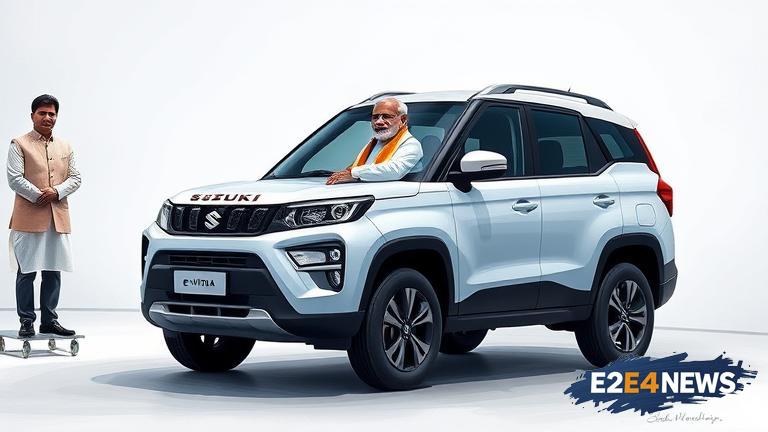On the second day of his Gujarat visit, Prime Minister Narendra Modi flagged off the Suzuki e-Vitara from the Hansalpur plant, a move that is expected to boost the country’s electric vehicle (EV) manufacturing sector. The launch of the Suzuki e-Vitara is a significant milestone in India’s journey towards becoming a major player in the global EV market. The Hansalpur plant, which is one of the largest manufacturing facilities in the country, has been producing vehicles for the domestic and international markets. With the launch of the e-Vitara, the plant is expected to play a crucial role in meeting the growing demand for electric vehicles in India. The Suzuki e-Vitara is a compact SUV that is powered by a lithium-ion battery and has a range of over 300 kilometers on a single charge. The vehicle is expected to be priced competitively and will be available in several variants. The launch of the e-Vitara is part of the government’s plan to promote the adoption of electric vehicles in the country. The government has set a target of having at least 30% of new vehicle sales as electric by 2030. To achieve this target, the government has announced several incentives, including tax exemptions and subsidies for EV manufacturers. The launch of the Suzuki e-Vitara is expected to give a boost to the country’s EV manufacturing sector, which has been growing rapidly in recent years. Several major automakers, including Tata Motors, Mahindra & Mahindra, and Hyundai, have already launched their EV models in the country. The government has also announced plans to set up a network of EV charging stations across the country to support the growth of the sector. The launch of the Suzuki e-Vitara is a significant milestone in the country’s journey towards becoming a major player in the global EV market. India is expected to become one of the largest EV markets in the world in the coming years, with several major automakers already having announced plans to launch their EV models in the country. The government’s plan to promote the adoption of EVs is expected to have a positive impact on the environment, with a reduction in greenhouse gas emissions and air pollution. The launch of the Suzuki e-Vitara is also expected to create new job opportunities in the EV manufacturing sector, which is expected to grow rapidly in the coming years. The government has announced several initiatives to support the growth of the sector, including the setting up of a national EV policy and the creation of a dedicated EV manufacturing hub. The launch of the Suzuki e-Vitara is a significant step towards achieving the government’s target of having at least 30% of new vehicle sales as electric by 2030. The vehicle is expected to be popular among Indian consumers, who are increasingly looking for environmentally friendly and cost-effective transportation options. The Suzuki e-Vitara is expected to compete with other EV models in the country, including the Tata Nexon EV and the Mahindra e-Verito. The launch of the vehicle is expected to give a boost to the country’s EV manufacturing sector, which has been growing rapidly in recent years. The government’s plan to promote the adoption of EVs is expected to have a positive impact on the environment and the economy, with a reduction in greenhouse gas emissions and air pollution. The launch of the Suzuki e-Vitara is a significant milestone in the country’s journey towards becoming a major player in the global EV market.
